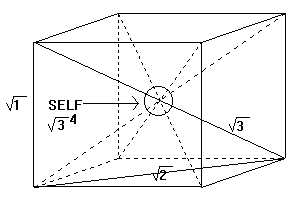Dimensions and the Trinity

Dear Readers,
Do you ever find that you have ignored a particular bit of theology because you feel that you do not even understand what you don’t understand? The concept of the Trinity is like that to me. I have wondered why people defend it so closely when I can not see what is so mysterious about it. I do not feel any wonder when people talk about what a mystery it is. It is like someone saying, “She just inherited 1,000,000,000,000$” ...I do not even know what that amount of 0’s means, let alone what it would take me to earn that at 7.60 an hour.
I have inherited several things from my parents. oddities, almost. One thing I have inherited from my dad is a fascination for little ponders. They will perhaps never be solved in this life, nevertheless they are very interesting. Like for example the names of the two thieves who hung next to Jesus, or whether Mars had an ancient route different from its present course... And of course, the infamous concept of dimensions. I It is infamous because in my younger days, when I was affectionately known as the Small-mass-of-confiusion, I would incoherently mumble about “truth...” and “The fourth dimension...” and demand that people listen.
But I was looking for a quote which I wanted to blog about in Mere Christianity. It was about how God makes us into a Castle, but I was distracted when I was skimming a place where he begins to talk about dimensions. He compared the Trinity to the third dimension, which I had never connected, but now it seems so obvious!
My dear reader, if you have any interest in dimensions and any confusion about the trinity, here is a passage From Lewis to perhaps shed some light on the matter...

I warned you that Theology is practical. The whole purpose for which we exist is to be thus taken into the life of God. Wrong ideas about what that life is will make it harder. And now, for a few minutes I must ask you to follow rather carefully.
You know that in space you can move in three ways--to left or right, backwards or forwards, up or down. Every direction is either one of these three or a combination between them. They are called the three dimensions. Now notice this. If you are using only one dimension, you could draw only a straight line. If you are using two, you could draw a figure, say a square. And a square is made up of four straight lines. Now a step further. If you have three dimensions, you can then build what we call a solid body: say a cube--a thing like a dice or a lump of sugar. And a cube is made up of six squares.
Do you see the point? A world of one dimension would be a straight line. In a two-dimensional world you still get straight lines, but many lines make on figure. In a three-dimensional world you still get figures but many figures make one solid body. In other words, as you advance to more real and more complicated levels, you di not leave behind you the things you found on the simpler levels: you still have them, but combined in new ways you could not imagine if you knew only the simpler levels.
Now the Christian account of God involves just the same principle. The human is a simple and rather empty level. On the human level one person is one being, and any wo persons are two separate beings--just as in two dimensions (say on a flat sheet of paper) one square is one figure, and any two squares are two separate figures. On the Divine level you still find personalities; but up there you find them combined in new ways which we, who do not live on that level cannot imagine. In God’s diminution, so to speak, you fins a being who is three Persons while remaining one Being, just as a cube is six squares while remaining one cube. Of course we cannot fully conceive a being like that: just as if we were so made that we perceived only two dimensions in space we could never properly imagine a cube. but we can get sort of a faint notion of it. And when we do, we are then, for the first time in our lives, getting some positive idea however faint, of something super-personal--something more than a person. It is something we could never have guessed, and yet, once one has been told one feels one ought to have been able to guess it because it fits in so well with all the things we know already.


0 Comments:
Post a Comment
<< Home